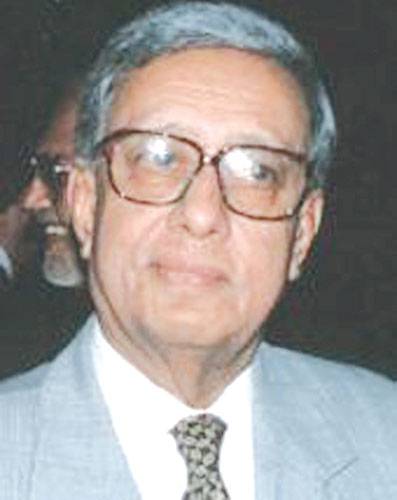ISLAMABAD - Former Chief Justice of Pakistan Sajjad Ali Shah passed away on Tuesday at the age of 84 in Karachi. The family sources have confirmed death of the former chief justice. Justice (Retd) Sajjad Ali Shah had been suffering from health issues over the past few days.
Sajjad Ali Shah remained Chief Justice of Pakistan from June 4, 1994 to December 2, 1997.
Chief Justice of Pakistan Mian Saqib Nisar and all the judges of Supreme Court have expressed deep sorrow and grief over the sad demise of Justice (Retd) Sajjad. They have extended their heartfelt condolences and sincere sympathies to members of the bereaved family.
The chief justice and the judges prayed to Almighty Allah to shower His blessings upon the departed soul and give patience to the bereaved family members to bear this irreparable loss with equanimity.
In the judicial history, Justice Sajjad stood against the then Prime Minister, Nawaz Sharif, while Justice Iftikhar Muhammad Chaudhry stood against the military dictator General (Retd) Pervez Musharraf.
Justice (Retd) Sajjad was appointed the CJP by former Prime Minister Benazir Bhutto. He was the 13th Chief Justice of Pakistan. When Benazir Bhutto government was dismissed by President Farooq Leghari on charges of corruption Sajjad Ali Shah along with six other members of the Supreme Court upheld this decision.
On November 28, 1997 when an unruly mob of the PML-N workers and leaders stormed the court building in Islamabad it forced Chief Justice Sajjad Ali Shah to adjourn the contempt of court case against the then Prime Minister Nawaz Sharif.
Former CJP was the lone dissenter in the 11-member bench of the apex court, whose decision had restored Nawaz Sharif to power in May 1993 as prime minister after he had been booted out by President Ghulam Ishaq Khan.
Justice Shah had also ordered the release of some civil servants who had been arrested on the orders of Nawaz Sharif. These events became the starting point of a long tussle between the two. The first confrontation by Nawaz Sharif was the establishment of special trial courts which were established in contravention of the advice of the chief justice. However, Sharif finally succeeded in dividing the superior court judges into two camps.
The infamous Article 58(2)-b, Eighth Amendment to the Constitution of Pakistan, which empowered the President of Pakistan to dismiss the National Assembly was restored by a bench headed by Justice Sajjad but it was suspended within minutes by another bench of the apex court.
A three-member bench headed by Chief Justice Sajjad Ali Shah suspended the operation of the 13th Amendment to restore the powers of the president to dissolve the National Assembly, a verdict that was set aside within minutes by another 10-member bench of the apex court.
The 10-member bench led by Justice Saeeduzzaman Siddiqui granted stay against CJ Sajjad Shah’s order minutes after it was passed, without receiving any formal petition. A formal complaint was issued by an advocate on which notice was taken and the decision of the chief justice was set aside.
All efforts to resolve the judicial crisis failed as both the groups of the superior court judges stuck to their stance and issued separate cause lists.
A two-member Quetta bench of the judges of the apex court who had refused to recognise Sajjad Shah as their chief justice. The bench headed by Justice Saeeduzzaman Siddiqui took up petitions questioning the validity of Shah’s appointment as chief justice and finally held his appointment in abeyance till further orders besides restraining him from performing judicial and administrative functions.
Sajjad Shah declared the order of the two-member bench at Quetta without lawful authority. But in a strange move, the circuit bench of the apex court at Peshawar endorsed the verdict of Quetta bench on a petition challenging the appointment of Shah as chief justice.






